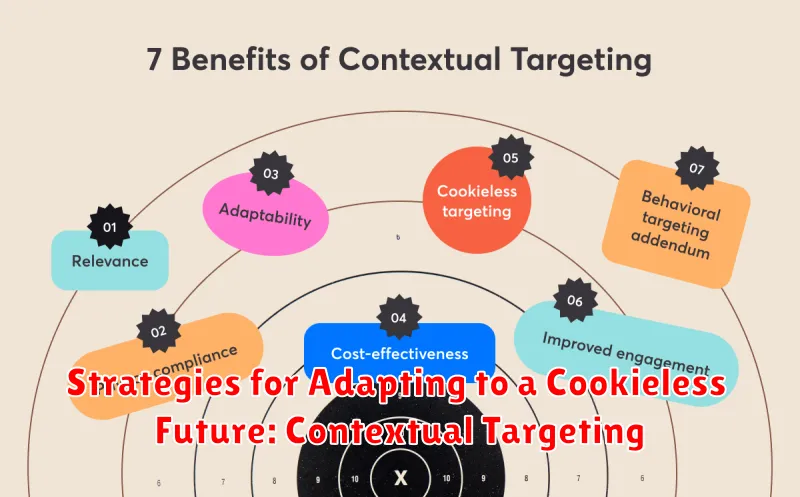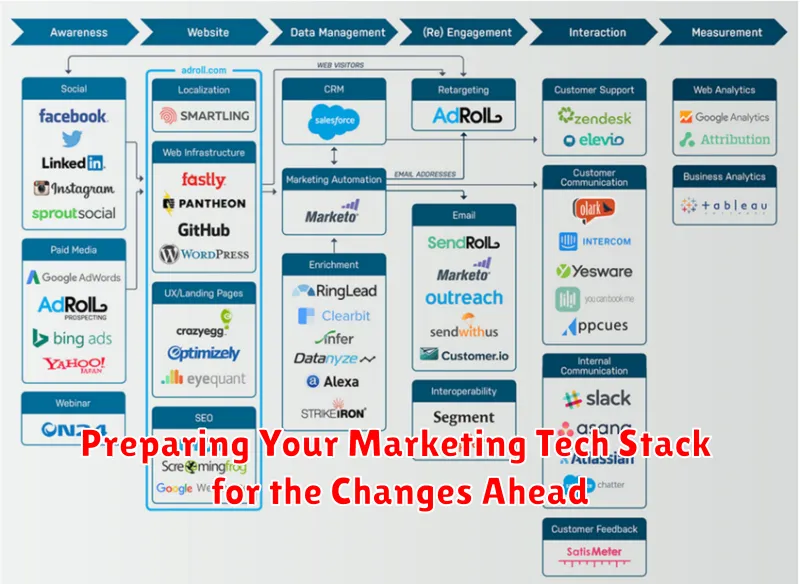The landscape of digital marketing is on the cusp of a seismic shift. As the industry grapples with evolving privacy standards and increasing consumer awareness regarding data usage, the impending cookie deprecation presents both a significant challenge and a unique opportunity. This article, “Navigating the Future: Understanding the Implications of Cookie Deprecation for Digital Marketing,” aims to provide a comprehensive overview of this critical transition, exploring the reasons behind it, the potential ramifications for marketers, and the innovative strategies required to thrive in a cookieless future. We will delve into the impact on areas such as targeted advertising, attribution modeling, and personalized customer experiences, providing actionable insights for professionals worldwide.
The reliance on third-party cookies has long been a cornerstone of digital advertising, enabling marketers to track user behavior across websites and deliver relevant, targeted campaigns. However, growing concerns about data privacy, spearheaded by regulations like the General Data Protection Regulation (GDPR) in Europe and the California Consumer Privacy Act (CCPA) in the United States, have accelerated the move towards a more privacy-centric web. Major browsers, including Google Chrome, are phasing out support for these tracking technologies, prompting the need for innovative, ethical, and sustainable solutions. This article will dissect these developments, examining the impact on data-driven marketing and highlighting the alternative strategies that are emerging to ensure effective and responsible audience engagement in the years to come.
What is Cookie Deprecation and Why is it Happening?
Cookie deprecation refers to the gradual phasing out of support for third-party cookies by web browsers. These cookies, which are placed on a user’s browser by a domain other than the one they are currently visiting, have been a cornerstone of digital advertising for years, enabling cross-site tracking and personalized advertising.
The primary driver behind this shift is growing consumer concerns about privacy. Users are becoming increasingly aware of how their online activities are tracked and used for targeted advertising. Regulations such as the General Data Protection Regulation (GDPR) and the California Consumer Privacy Act (CCPA) have further emphasized the need for greater data privacy and transparency.
Major browsers like Safari and Firefox have already implemented measures to block or limit third-party cookies. Google Chrome, which holds the largest market share, is also phasing them out. This move necessitates a significant change in how digital marketers collect data, target audiences, and measure campaign performance.
The Impact of Cookie Deprecation on Data Collection and Targeting
The deprecation of third-party cookies significantly alters how marketers collect data and target audiences. Historically, these cookies have been instrumental in tracking user behavior across the web, enabling personalized advertising and detailed user profiling. With their removal, traditional methods of behavioral targeting will become obsolete.
This shift necessitates a move away from relying on broad, aggregated data towards more privacy-conscious and direct data collection strategies. Marketers will face challenges in accurately identifying and segmenting their target audiences, potentially leading to a decrease in the effectiveness of ad campaigns and a need for more sophisticated targeting techniques.
Consider the following implications:
- Reduced ability to track users across domains.
- Difficulty in building detailed user profiles based on browsing history.
- Increased reliance on alternative targeting methods.
Ultimately, cookie deprecation forces marketers to re-evaluate their data strategies and prioritize user privacy while seeking innovative solutions for data collection and targeting.
How Cookie Deprecation Affects Measurement and Attribution
The deprecation of third-party cookies presents significant challenges to digital marketing measurement and attribution. Traditionally, cookies have been used to track user behavior across the web, enabling marketers to understand the customer journey and attribute conversions to specific marketing efforts.
Without cookies, accurately measuring the effectiveness of campaigns becomes more difficult. Attribution models that rely on cookie-based tracking, such as last-click attribution, will become less reliable. This can lead to skewed data and potentially misinformed decisions about marketing spend.
Marketers will need to adopt new methodologies and technologies to maintain accurate measurement and attribution. This includes exploring alternative identifiers, investing in more sophisticated attribution models, and focusing on aggregated, anonymized data to understand overall trends without tracking individual users.
Strategies for Adapting to a Cookieless Future: Contextual Targeting

With the impending deprecation of third-party cookies, contextual targeting is experiencing a resurgence as a vital strategy. This approach focuses on placing advertisements on web pages based on the content of the page itself, rather than relying on user data collected through cookies.
Key benefits include enhanced privacy for users and the ability to reach audiences interested in specific topics. By analyzing keywords, categories, and overall themes of a website, advertisers can deliver relevant ads without needing to track individual browsing behavior.
Contextual targeting can be implemented using various tools and platforms that analyze website content in real-time. This allows for dynamic ad placement that aligns with the user’s immediate interests, improving ad relevance and potential engagement.
Leveraging First-Party Data and Customer Relationships
In the wake of cookie deprecation, first-party data emerges as a cornerstone for effective digital marketing. This data, collected directly from your audience, offers unparalleled insights into customer behavior, preferences, and needs.
Building and nurturing strong customer relationships is paramount. Encourage data sharing through:
- Loyalty programs: Reward customers for providing information.
- Personalized experiences: Use data to tailor content and offers.
- Transparent communication: Clearly articulate the value exchange for data.
First-party data allows for more accurate targeting, personalized messaging, and improved attribution, ultimately driving stronger ROI in a cookieless environment.
Exploring Privacy-Focused Advertising Solutions
The impending deprecation of third-party cookies necessitates the exploration and adoption of privacy-focused advertising solutions. These solutions prioritize user privacy while still enabling effective advertising campaigns.
Differential Privacy
Differential privacy adds statistical noise to datasets, allowing advertisers to gain insights without identifying individual users.
Federated Learning
Federated learning enables machine learning models to be trained on decentralized devices, such as smartphones, without sharing the raw data. This approach keeps user data on the device, enhancing privacy.
Privacy-Preserving Data Clean Rooms
Privacy-preserving data clean rooms provide a secure environment where multiple parties can analyze combined datasets without revealing the underlying raw data.
On-Device AI
On-Device AI empowers the processing of data directly on the user’s device. This reduces the need to transmit data to external servers, thus bolstering privacy.
The Role of Identity Resolution in a Cookieless World
In a cookieless landscape, identity resolution emerges as a crucial capability for marketers. It focuses on connecting disparate data points about a user across various devices and channels to create a unified view of the customer.
Key Benefits of Identity Resolution:
- Improved Personalization: By understanding the individual customer journey, marketers can deliver more relevant and personalized experiences.
- Enhanced Targeting: Identity resolution allows for more accurate audience segmentation and targeting, even without third-party cookies.
- Accurate Measurement: Connecting touchpoints across channels provides a more complete picture of campaign performance and attribution.
Achieving effective identity resolution often involves leveraging deterministic and probabilistic matching techniques, and ethical data practices are paramount to maintain user trust and comply with privacy regulations.
Preparing Your Marketing Tech Stack for the Changes Ahead

The impending cookie deprecation necessitates a thorough evaluation and adaptation of your marketing technology stack. This proactive approach ensures continued efficacy in a rapidly evolving digital landscape.
Key Considerations:
- Audit Existing Tools: Identify tools reliant on third-party cookies for data collection, targeting, and measurement.
- Assess Compatibility: Determine which platforms are actively developing cookieless solutions and prioritize their adoption.
- Explore Integration Capabilities: Ensure seamless integration between your chosen solutions to maintain data consistency and workflow efficiency.
Actionable Steps:
- Invest in First-Party Data Management Platforms: Implement systems to securely collect, manage, and activate first-party data.
- Evaluate Contextual Advertising Platforms: Research and test platforms that leverage contextual signals for targeting.
- Implement or Enhance a Customer Data Platform (CDP): A CDP can centralize customer data and provide a unified view for personalization and targeting.
By taking these steps, you can proactively future-proof your marketing tech stack and mitigate the impact of cookie deprecation.
Best practices for navigating cookie deprecation
Navigating cookie deprecation requires a proactive and strategic approach. The following best practices can help organizations adapt and maintain effective digital marketing efforts:
- Prioritize First-Party Data: Implement robust systems for collecting and managing first-party data, ensuring compliance with privacy regulations.
- Invest in Contextual Targeting: Explore and refine contextual targeting strategies to reach relevant audiences without relying on individual tracking.
- Evaluate Privacy-Focused Solutions: Research and test privacy-preserving advertising technologies to identify solutions that align with your business goals.
- Enhance Customer Relationships: Focus on building direct relationships with customers through personalized communication and valuable experiences.
- Regularly Monitor and Adapt: Stay informed about industry developments and adjust your strategies based on performance and evolving privacy landscapes.
By embracing these best practices, businesses can mitigate the impact of cookie deprecation and build a more sustainable and privacy-conscious digital marketing ecosystem.
Future-Proofing Your Marketing Strategy
Future-proofing your marketing strategy in the face of cookie deprecation requires a proactive and adaptable approach. The key is to diversify your data sources and marketing tactics to mitigate reliance on third-party cookies.
Here are essential steps:
- Invest in first-party data collection and management.
- Explore contextual advertising opportunities.
- Implement a robust Customer Relationship Management (CRM) system.
- Analyze the performance of alternative targeting methods.
By implementing these strategies, businesses can navigate the evolving digital landscape and maintain effective marketing campaigns while respecting user privacy.

